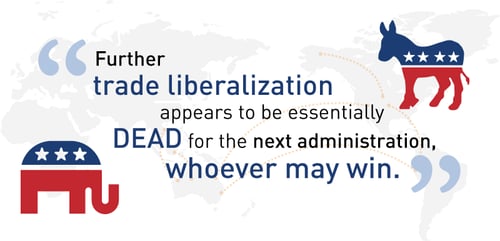As do many economists, I have a strong bias for free trade. These are not happy times for those of us with such a perspective. A largely bipartisan consensus on the benefits of free trade seems to have vanished, and trade policy is at risk in today’s political arena.
There is a serious risk of unhappy times if a full-scale trade war breaks out, as I believe it could. The financial shock from a trade war, if it happened, would make Brexit look like a walk in the park.
 Further trade liberalization appears to be essentially dead for the next administration, whoever may win. Hillary Clinton has disavowed the Trans-Pacific Partnership (TPP) trade deal that she helped negotiate and once praised, and she has repeatedly emphasized the need to step-up enforcement of existing trade laws. Maintaining the status quo, rather than further liberalizing trade, which the TPP would do, appears to be her approach, for now.
Further trade liberalization appears to be essentially dead for the next administration, whoever may win. Hillary Clinton has disavowed the Trans-Pacific Partnership (TPP) trade deal that she helped negotiate and once praised, and she has repeatedly emphasized the need to step-up enforcement of existing trade laws. Maintaining the status quo, rather than further liberalizing trade, which the TPP would do, appears to be her approach, for now.
Donald Trump is also against the TPP, and other agreements as well. He is against the trade liberalization agreements that have characterized the last generation of politics and has pledged to undo those agreements. If he became president and implemented his proposed agenda, the US could end up in a trade war. It must be remembered that presidential power in the area of trade is unique in that he or she can act without congressional assent on many issues.
A President’s Enormous Powers in the World of Trade
I don’t worry much about domestic issues in the conflict between Trump and Clinton, the reason being that many important issues are decided by Congress and the courts. No president can spend money or change taxes without congressional authorization. Administration actions can come under court review, as is happening now with the Environmental Protection Agency climate plan. Under our system of federalism, many decisions are left to the states and local governments. And in any case, much of the economy is under private ownership; we don’t depend on the White House for new apps for our smart phones, or new pharmaceuticals, or innovations in auto engine design.
International trade policy is an exception. Congress has granted over the decades under many different laws broad discretionary powers to the president on international trade matters. I think that is largely because foreign policy is considered under presidential control. Congress insists on having the say on granting trade liberalization but grants vast powers to the president for taking it away.
The president has enormous powers to tear up trade agreements and, in many cases, to impose tariff penalties to advance US interests as interpreted by the president. While Clinton has restrained herself from making bold statements on the issue of trade, Trump has suggested a willingness to use such powers.

MALR016115



 Further trade liberalization appears to be essentially dead for the next administration, whoever may win. Hillary Clinton has disavowed the Trans-Pacific Partnership (TPP) trade deal that she helped negotiate and once praised, and she has repeatedly emphasized the need to step-up enforcement of existing trade laws. Maintaining the status quo, rather than further liberalizing trade, which the TPP would do, appears to be her approach, for now.
Further trade liberalization appears to be essentially dead for the next administration, whoever may win. Hillary Clinton has disavowed the Trans-Pacific Partnership (TPP) trade deal that she helped negotiate and once praised, and she has repeatedly emphasized the need to step-up enforcement of existing trade laws. Maintaining the status quo, rather than further liberalizing trade, which the TPP would do, appears to be her approach, for now.
